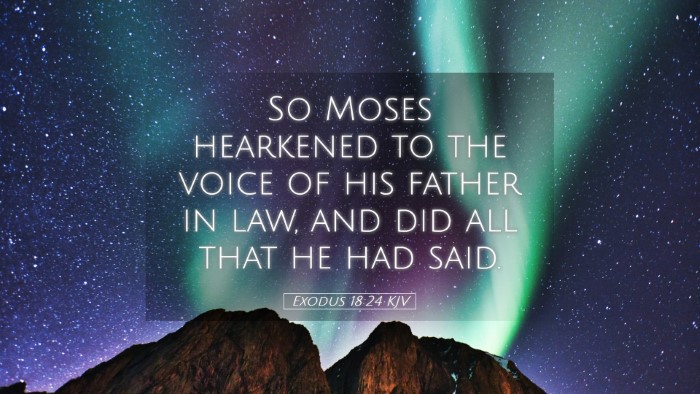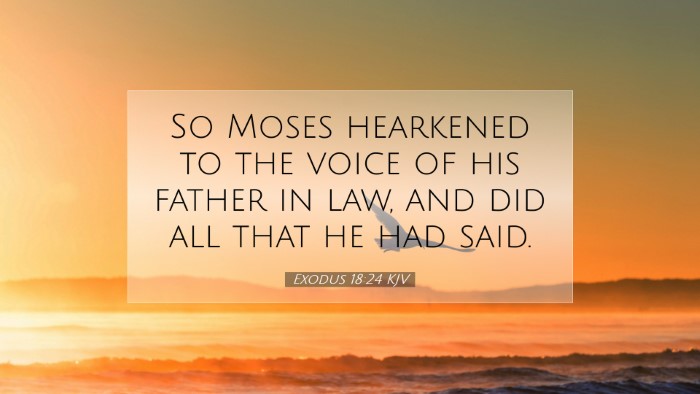Commentary on Exodus 18:24
Verse Text: "So Moses hearkened to the voice of his father-in-law, and did all that he had said."
This verse occurs in the context of Jethro’s advice to Moses regarding the administration of justice among the Israelites. Jethro, observing how Moses was overburdened with the task of judging the people from morning till evening, provides wisdom that not only aids Moses but also enhances the efficiency of leadership among the people.
1. The Importance of Listening to Wise Counsel
Moses hearkened to the voice of his father-in-law...
This phrase illustrates the humility and wisdom of Moses. Despite his elevated status as the leader of Israel, he recognizes the value of Jethro's insights. Matthew Henry notes that leaders often require counsel from others, regardless of their authority or experience. It serves as a reminder of the necessity of surrounding oneself with wise advisors. Leaders must be receptive to feedback and willing to acknowledge the limits of their understanding.
2. The Role of Authority in Governance
Jethro’s advice sets a precedent for shared leadership. By delegating authority to others, Moses not only lightens his burden but also empowers other capable leaders among the Israelites. Albert Barnes emphasizes that effective governance involves the distribution of responsibility to avoid the pitfalls of tyranny and burnout. In the church, this model of leadership through shared responsibilities remains profoundly applicable; pastors and church leaders benefit from establishing structures that allow others to exercise their gifts.
3. Practical Implementations of Jethro's Advice
- Delegation: Moses learned to appoint lesser judges who could handle smaller disputes, thereby conserving his time for more significant issues.
- Training Others: By equipping chosen leaders, Moses ensured that the people had immediate access to justice, which strengthened community ties.
- Focus on Greater Matters: Delegating responsibilities allowed Moses to devote himself to his most critical duties, such as leading the people in their covenant relationship with God.
4. The Nature of Submission and Obedience
A notable point is that Moses, while being in a divinely appointed position, demonstrated submission to the counsel of a man. Adam Clarke emphasizes that this reflects a greater principle of humility and teachability. Even those who are divinely chosen for leadership must remain willing to listen and submit to godly counsel. This teaches that spiritual authority is not merely about power but about wisdom in governance.
5. Implications for Contemporary Church Leadership
The example set by Moses points towards collaborative forms of leadership. In a church setting, this could manifest in various ways:
- Establishing Leadership Teams: Just as Moses appointed judges, churches benefit from elder boards or ministry teams that share responsibilities and governance.
- Creating Feedback Loops: Like Moses, church leaders should cultivate environments where feedback is welcomed and utilized to improve ministries.
- Encouraging Lay Leadership: The empowerment of lay members to take active roles in ministry echoes the principles Jethro imparted.
6. Summary and Reflection
Exodus 18:24 serves as a profound reminder that wisdom comes in many forms and often through unexpected channels. Moses’ willingness to heed Jethro's advice demonstrates a heart aligned with God's intention for community and leadership. Leaders today, whether in secular or sacred environments, should be inspired by this narrative to establish structures that promote delegation, responsibility sharing, and encouragement among peers. The virtues of humility, receptiveness to counsel, and collaborative leadership are timeless principles that enhance effectiveness and foster unity.


